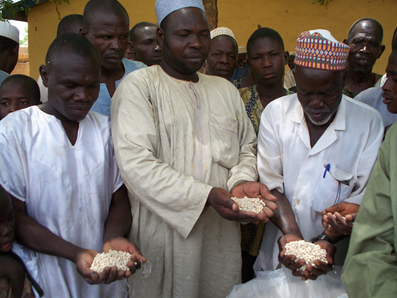Comparative response of Callosobruchus maculatus (Fab.) (Coleoptera: Chysomelidae) to Momordica charantia and Acalypha wilkesiana powders in stored cowpea (Vigna unguiculata) (Walp.)

Abstract
Post-harvest preservation of cowpea in developing countries has been a major challenge owing to Callosobruchus maculatus infestation. The study compares response of C. maculatus (F) to Momordica charantia and Acalypha wilkesiana powders in stored cowpea seeds under laboratory atmosphere. Five pairs of freshly emerged C. maculatus adults were introduced into Petri-dish containing 20 g of cowpea admixed with 0.2, 0.4, 0.6 and 0.8 g of each plant powder, replicated thrice and arranged in a complete randomization design. Adult mortality was recorded at 24 h interval for 5 days, oviposition was recorded after 48 h. While newly emerged insects were recorded 30-35 days after infestation and weight loss was also determined. The treatments showed significant increase in C. maculatus adult mortality as the time of exposure and dosage increases, with highest values (90 and 100% for A. wilkesiana and M. charantia, respectively) at 120 h of exposure and 0.8 g dosage level. At 0.8 g, A. wilkesiana (66.3) and M. charantia (63.0) treated seeds recorded significantly lower number of eggs laid. Similar trend was equally observed for adult emergence and percentage weight loss. The study revealed that both plants had significant insecticidal effects and clearly showed that M. charantia was more effective than A. wilkesiana, but did not show higher significant differences in all the parameters assessed. This indicated that these plant powders have prospective to safeguard cowpea seeds in store from C. maculatus infestation and damage. Therefore, these plant should be included in the Integrated Pest Management Strategies for cowpea storage by small scale farmers.
Keywords
Bio-insecticides, Seeds, Postharvest preservation, Adult mortality, IPM
References
Adesina, J.M., L.A. Afolabi, and T.I. Ofuya. 2012. Evaluation of insecticidal properties of Momordica charantia in reducing oviposition and seed damage by Callosobruchus maculatus (Fab.) J. Agric. Technol. 8(2), 493-499.
Adesina, J.M. and T.E. Mobolade-Adesina. 2020. Callosobruchus maculatus (Fab.) Coleoptera: Chrysomelidae) Infestation and Tolerance on Stored Cowpea Seeds Protected with Anchomanes difformis (Blume) Engl. Extracts. J. Hortic. Post-Harvest Res. 3(2), 367-378.
Adesina, J.M., T.I. Ofuya, and Y. Rajashekar. 2016. Efficacy of some plant extracts against cotton strainers, Dysdercus superstitious (Herrich Schaffer) (Hemiptera: Pyrrhocoridae). J. Entomol. Zool. Stud. 4(4), 170-174.
Ileke, K.D. and O.F. Olotuah. 2012. Bioactivity of Anacardium occidentale (L.) and Allium sativum (L.) powders and oils extract against cowpea bruchid, Callosobruchus maculatus (Fab.). [Coleoptera: Chrysomelidae]. Int. J. Biol. 4(1), 96-103. Doi: https://doi.org/10.5539/ijb.v4n1p96
Iloba, B.N. and T. Ekrakene. 2006. Daily mortality responses of Callosobruchus maculatus and Sitophiltus zeamais to change in the concentration of Azadirachta indica, Ocilmum gratissium and Hyptis svaveolens. J. Entomol. 3(4), 271-276. Doi: https://doi.org/10.3923/je.2006.271.276
Jayakumar, M., N. Raja, and S. Ignacimuthu. 2003. Efficacy of crude extracts of Hyptis suaveolens and Melochia corchorifolia on pulse beetle Callosobruchus maculatus. pp. 218-221. In: Ignacimuthu, S. and J. Eyaraj, (eds.). Biological control of insect pests. Phoenix Publishing House, New Delhi.
Kouninki, H., S. Ngamo, T. Hance, and M.B. Ngassoum. 2009. Potential use of essential oils from local Cameroonian plants for the control of red flour weevil Tribolium castaneum. Afr. J. Food Agric. Nutr. Dev. 7, 1-15.
Obembe, O.M. and O.C. Ogungbite. 2017 Comparative insecticidal activities of some botanical powders and pirimiphos-methyl against Callosobruchus maculatus Fab. (Coleoptera: Bruchidae) infesting cowpea seeds. MOJ Biol. Med. 2(4), 305-309. Doi: https://doi.org/10.15406/mojbm.2017.02.00063
Obeng-Oforie, D., C.H. Reichnuth, J. Bekele, and A. Hassan-Ali. 1997. Biological activity of 1, 8 cimeole a major component of essential oil of Ocimum kenyense (Ayobamgia) against stored product beetle. J. Appl. Entomol. 121, 237-243. Doi: https://doi.org/10.1111/j.1439-0418.1997.tb01399.x
Olaifa, J.I. and W. Erhun. 1998. Laboratory evaluation of Piper guineense for the protection of cowpea against Callosobruchus maculatus. Int. J. Trop. Insect Sci. 9(1), 55-59. Doi: https://doi.org/10.1017/S1742758400010031
Oni, M.O. 2014. Entomotoxic efficacy of cayenne pepper, sweet pepper and long cayenne pepper oil extracts against Sitophilus zeamais infesting maize grain. Mol. Entomol. 5(5), 37.
Oni, M.O., O.C. Ogungbite, and T.I. Ofuya. 2018a. Biotoxic efficacy of different fractions of Acalypha godseffiana oil extracts against Callosobruchus maculatus infesting stored cowpea. Med. Plant Res. 8(2), 8-13. Doi: https://doi.org/10.5376/mpr.2018.08.0002
Oni, M.O., B. Oyawoye, R.A. Adebayo, T.I. Ofuya, and O.C. Ogungbite. 2018b. Entomocidal efficacy of crude oil and fractions of Mormodica charantia (L) oil extract against cowpea bruchid Callosobruchus maculatus (Fab) infesting stored cowpea seeds. Appl. Trop. Agric. 23(1), 120-125.
Parugrug, M.L. and C. Aurea. 2008. Insecticidal action of five plants against maize weevil, Sitophilus Zeamais Motsch. (Coleptera: Curculionidae). KMITL Sci. Tech. J. 8(1), 24-38
Raja, N., A. Babu, S. Dorn, and S. Ignacimuthu. 2001. Potential of plants f or protecting stored pulses from Callosobruchus maculatus (Coleoptera: Bruchidae) infestation. Biol. Agric. Hortic. 19, 19-27. Doi: https://doi.org/10.1080/01448765.2001.9754906
